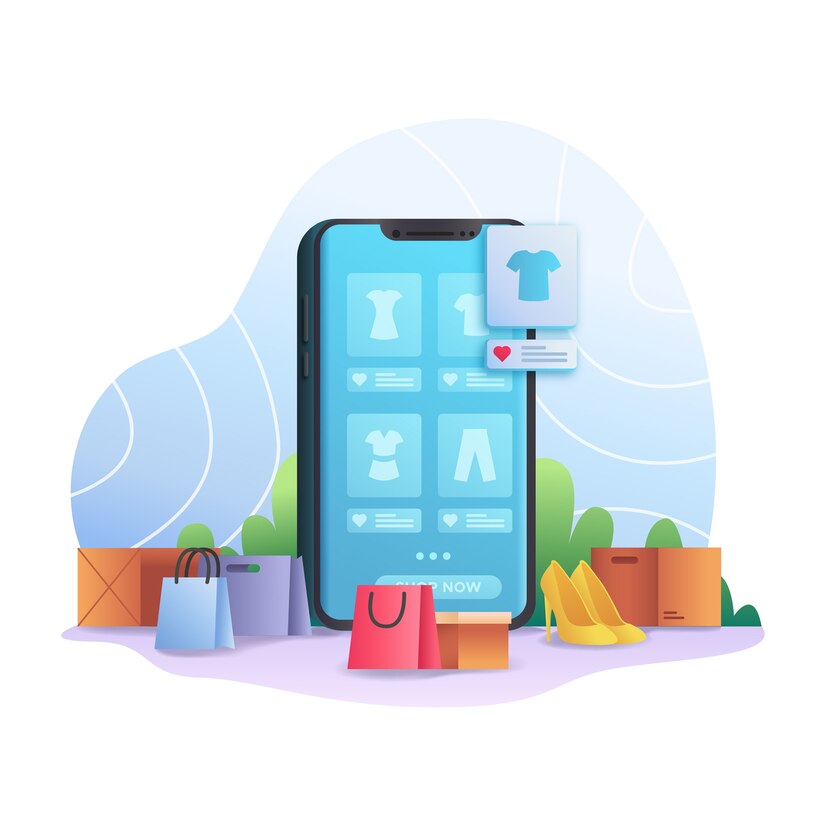The ecommerce industry has revolutionized retail, enabling customers to shop from their smartphones, tablets, and computers with ease. With the rapid growth in mobile users and online shopping demand, businesses are increasingly investing in ecommerce app development to gain a competitive edge. A well-designed ecommerce app can drive sales, enhance customer engagement, and boost brand loyalty. However, creating a successful ecommerce app involves careful planning and a solid understanding of various factors that can influence its effectiveness.
This article discusses the essential factors to consider when developing an ecommerce app, from choosing the right technology to ensuring security and user experience.
1. Understanding Your Target Audience and Market
Before embarking on the ecommerce app development journey, it’s crucial to identify your target audience and understand their preferences. The audience determines not only the design and features of the app but also the overall strategy behind the app’s functionality.
- Demographics and Preferences: Research your audience's age, location, shopping habits, and spending behaviors. For instance, an audience targeting younger users might demand a more visually engaging, social media-integrated experience.
- Market Research and Competitor Analysis: Look into competitors within the same industry to analyze their strengths and weaknesses. By understanding what works well in similar apps, you can refine your own app's features and design to provide a unique selling proposition.
Defining the target market early in the process enables your ecommerce app development to be more aligned with user needs, potentially resulting in better engagement and sales.
2. Choosing the Right Technology Stack
The technology stack is the foundation of any app, influencing its scalability, performance, and security. The choice of technology depends on the app’s complexity, target platform, and business goals.
- Backend and Frontend Requirements: An ecommerce app requires a robust backend to manage data, store transactions, and handle user information securely. The frontend should be visually appealing and responsive.
- Native vs. Cross-Platform: Decide whether to build a native app (specific to iOS or Android) or a cross-platform app (works on multiple platforms). Native apps often deliver better performance, but cross-platform development is cost-effective and speeds up time-to-market.
- API and Integrations: Your app may need to integrate with third-party services for payment processing, customer support, and analytics. A reliable Ecommerce App Development Company can help you select and integrate APIs that enhance app functionality without compromising security.
Selecting the appropriate technology stack is critical, as it directly impacts the app’s performance and user experience. It’s advisable to consult with an Ecommerce Mobile App Development Company to ensure the chosen stack aligns with long-term business objectives.
3. Designing a User-Friendly Interface (UI) and Experience (UX)
In ecommerce, a seamless user experience is paramount. A well-designed interface can significantly improve customer retention and sales conversion rates.
- Easy Navigation: Implement clear, intuitive navigation with organized categories and search options to help users find products easily.
- Personalization: Use machine learning and analytics to provide personalized product recommendations and offers based on user behavior and purchase history. This can make customers feel valued and encourage them to return.
- Fast and Simple Checkout Process: Simplify the checkout process by minimizing the number of steps. Features like one-click checkout and guest checkout can reduce cart abandonment.
By prioritizing a user-friendly design and experience, businesses can increase customer satisfaction and conversion rates. Partnering with a specialized Ecommerce Mobile App Development team can ensure a design that meets the specific needs of ecommerce shoppers.
4. Performance Optimization for Mobile Devices
Performance optimization is crucial for ecommerce mobile apps, as slow loading times can deter potential customers. Today’s customers expect quick load times and smooth transitions, especially during peak shopping seasons.
- Speed Optimization: Compress images, utilize caching, and limit heavy code and animations that may slow down the app.
- Device Compatibility and Responsiveness: Test the app on various devices and screen sizes to ensure it adapts well to different displays.
- Lightweight Features: Avoid heavy functionalities that could lead to slower performance. Features like image optimization and lazy loading can help improve app speed without sacrificing quality.
Ensuring the app performs well under high traffic conditions can reduce bounce rates and increase conversions, making this factor a top priority for any ecommerce mobile app development project.
5. Secure Payment Options
Providing secure and reliable payment methods is essential to building customer trust in an ecommerce app. Payment security helps customers feel confident about their purchases and protects sensitive data.
- Multiple Payment Options: Support diverse payment methods, such as credit/debit cards, digital wallets, and bank transfers. The more options available, the more convenient it is for customers.
- Encryption and SSL: Protect customer data using SSL certificates and encryption. These tools help secure transactions and safeguard user information.
- Compliance Standards: Ensure your app complies with PCI-DSS standards (Payment Card Industry Data Security Standard), which govern the handling of credit card information.
Secure payment integration is critical for ecommerce apps, and a skilled Ecommerce Application Development Services provider can guide you through implementing and managing payment security.
6. Integration with Analytics and Tracking Tools
Data-driven decision-making can enhance the app’s effectiveness and increase revenue by providing insights into customer behavior and app performance.
- Customer Behavior Analytics: Tools like Google Analytics and Mixpanel can provide insights into user interactions, popular products, and shopping trends. This data can be used to refine your product offerings and marketing strategies.
- Performance Monitoring: Use tracking tools to monitor app performance, load times, and server responses. Regular analysis can help identify and address issues before they impact user experience.
- Marketing Analytics: Tracking data related to user acquisition, conversion rates, and abandoned carts can inform your marketing and retargeting strategies.
Integrating analytics tools into the app gives you valuable insights into how users interact with your ecommerce solutions, allowing for continuous improvement.
7. Effective Product Management and Inventory Control
An ecommerce app should offer seamless inventory management and product catalog management. Customers expect product availability information and accurate delivery estimates when browsing.
- Inventory Management System Integration: Connect the app to your existing inventory management system to ensure stock levels are updated in real-time, preventing overselling.
- Product Information Management: Use a centralized system to manage and update product descriptions, images, and pricing across all platforms. Consistent and accurate product information builds customer trust.
- Automatic Restocking Notifications: Notify customers when products are back in stock, allowing for a smooth shopping experience and reducing customer frustration.
Effective product and inventory management are vital in delivering a smooth shopping experience, reducing potential issues, and enhancing the reputation of your brand.
8. Customer Support and Engagement Features
Customer support can greatly enhance user experience and help with customer retention. Providing easy access to help ensures a more satisfying shopping experience for users.
- In-App Chat and Support: Integrate customer support options, such as chatbots and live chats, to help customers with their queries in real-time.
- Order Tracking and Notifications: Offer order tracking features and push notifications to keep users updated on their order status, shipping, and delivery.
- Feedback and Ratings: Encourage users to provide feedback on products and services, helping build credibility and giving insights into areas of improvement.
A well-rounded customer support system is essential for addressing user concerns and increasing satisfaction, which in turn boosts brand loyalty and retention.
9. Marketing and Push Notifications
Effective marketing strategies can increase user engagement and app usage. Use the following methods to keep your users informed and engaged:
- Push Notifications: Notify users about sales, new arrivals, or abandoned carts through push notifications. Targeted notifications can help boost conversions.
- Promotions and Discounts: Implement promotional banners and exclusive in-app discounts to encourage customers to make purchases.
- Social Media Integration: Enable social sharing options to allow users to share their purchases or wish lists, enhancing app visibility.
Push notifications and other marketing tools can make your ecommerce app development more impactful, drawing users back to the app and driving conversions.
10. Regular Updates and Maintenance
An ecommerce app requires regular maintenance to stay relevant, secure, and up-to-date with market trends and technology.
- Security Updates: Frequent updates ensure the app is protected from the latest security threats and vulnerabilities.
- Bug Fixes and Performance Improvements: Regular maintenance helps resolve any bugs or issues that users report, keeping the app functioning smoothly.
- Feature Enhancements: Add new features and functionality as per user feedback or changing market needs to keep your app competitive.
Engaging in continuous updates is vital for an app’s longevity and helps provide a seamless, up-to-date user experience. Professional Ecommerce Application Development Services can manage these updates efficiently to ensure the app remains competitive.
Conclusion
Creating a successful ecommerce app involves much more than simply designing a shopping platform. By focusing on factors such as technology, user experience, performance optimization, and secure payment integration, businesses can build an app that not only meets users’ expectations but also drives long-term success.
Working with a specialized Ecommerce App Development Company ensures you have expert guidance in implementing these crucial elements, providing the foundation for a smooth and engaging shopping experience. For brands aiming to thrive in today’s digital landscape, investing in ecommerce mobile app development is an essential step towards establishing a strong online presence and building customer loyalty.
Choosing the right ecommerce solutions and maintaining a customer-focused approach can set your app apart in an increasingly crowded market, helping your business grow and adapt in the fast-paced world of ecommerce.






Comments